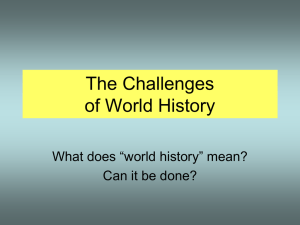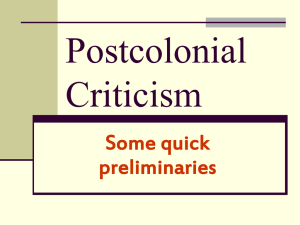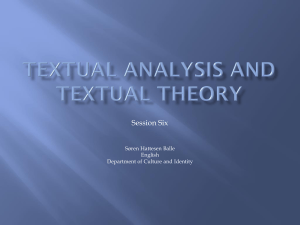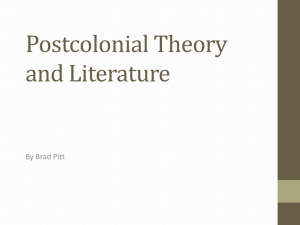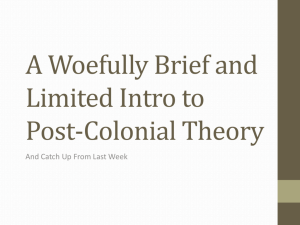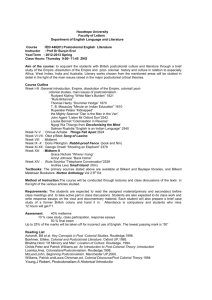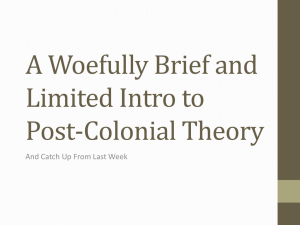Postcolonialism - My Teacher Pages
advertisement
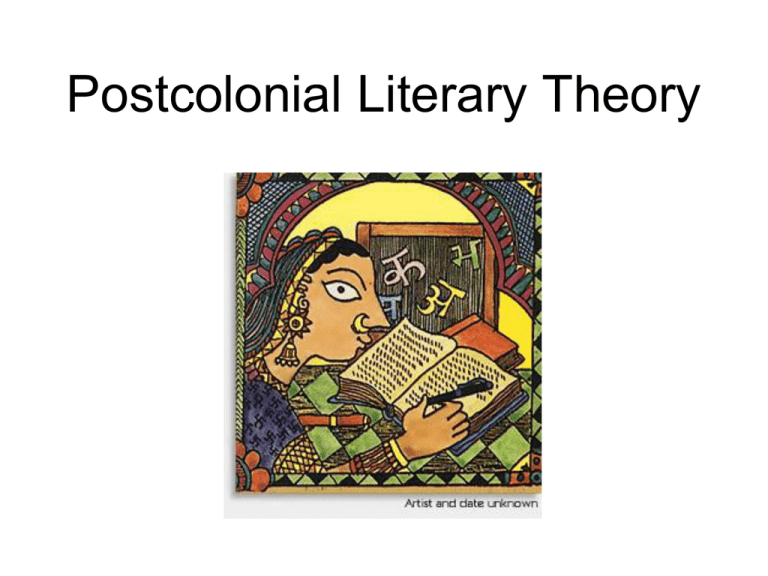
Postcolonial Literary Theory What is Colonialism? What Happened during Colonialism? • During the colonial era white Europeans ventured into the socalled underdeveloped countries in Africa and Asia and dominated a lot of geographical spaces there. Impact of Colonialism • White Europeans: How do Colonial Powers Justify their Actions? Justifying Colonialism • The colonized are savages Justifying Colonialism • The culture of the colonized is not up to the standard of the colonizer Justifying Colonialism • The colonized nation is unable to manage and run itself properly Justifying Colonialism • The colonized nation embraces a set of heathen religious beliefs How did the Colonists Stay in Power? OPPRESSION Oppressions • Oppression is a basic ingredient of colonialism. • Oppression dehumanizes • Colonialism spawned national movements Response to Oppression • Thus in the thickness of colonialism, national movements, and most of them were radical and violent in their approaches, emerged to encounter the aggression of colonialism. Che Guavara What was the Impact of Colonialism? Impact of Colonialism • The total or partial erosion of the colonized culture Impact of Colonialism • The total rejection by some elements among the colonized Impact of Colonialism • The categorization of the world into ranks Impact of Colonialism • The emergence of different forms of fundamentalism Impact of Colonialism • The emergence of bourgeoisie classes Impact of Colonialism • The emergence of societies with a lot of contradictions and split loyalties. So What is Postcolonialism? • To put it simply, postcolonialism examines what happens socially, economically, politically, and culturally to former colonies once they become independent. What are the Assumptions of Postcolonialism? Cultural Relativism Ambivalence towards Authority Alienation • Colonialism and Postcolonialism leads to the alienation of the native in his own land. Resurrecting Culture • Among the many challenges facing postcolonial writers are the attempt to both resurrect their culture and to combat the preconceptions about their culture. So What is Postcolonial Literary Theory? • Postcolonial literary theory involves the analysis of literary texts So What is Postcolonial Literary Theory? • Alternatively, it can refer to the analysis of texts What does Postcolonial Theory Focus On? Cultural Distortion • The way in which literature by the colonizing culture distorts the experience and realities, and inscribes the inferiority, of the colonized people. Literature of the Colonized • On literature by colonized peoples which attempts to articulate their identity and reclaim their past in the face of that past's inevitable otherness. Impact on the Colonizers • It can also deal with the way in which literature in colonizing countries appropriates the language, images, scenes, traditions and so forth of colonized countries. Mixing of Cultures • This mixing of cultures is another principal theme in postcolonial fiction, and it is often developed in the broader context of establishing identity. Important Figures in Postcolonial Literary Theory Frantz Fanon (1925-1961) • Most Important Works: Black Skin, White Masks The Wretched of the Earth Edward Said (1935-2003) • Most Important Works: Orientalism Culture and Imperialism Homi Bhabha (1949-present) • In his essay "Postcolonial Criticism" (1992), Bhabha has shown how certain cultures (mis)represent other cultures, thereby extending their political and social domination in the modern world order. Gayatri Spivak (1942-present) • In her article "Can the Subaltern Speak?“ Spivak reveals the tendency of institutional and cultural practices to exclude and marginalize the subaltern, especially subaltern women. Important Colonial and Postcolonial Novelists Daniel Defoe (1660-1731) • Defoe's famous novel Robinson Crusoe (1719), tells of a man's shipwreck on a desert island and his subsequent adventures. Joseph Conrad (1857-1924) • In his novella, Heart of Darkness, tells the story of a man named Marlow who details a visit he took up the Congo River to investigate the work of Kurtz, a Belgian trader in ivory in the Congo Free State. E. M. Forster (1879-1970) • In his novel, A Passage to India, Forster tells the story of a British woman who accuses an Indian doctor of sexually assaulting her. The ensuing court trial increases the racial tension between the Indians and the British and foreshadows the end of the British Raj. Salman Rushdie (1947-present) • Important Works: Midnight's Children The Satanic Verses The Moor's Last Sigh Shalimar the Clown V. S. Naipaul (1932-present) • Important Works The Mystic Masseur A House for Mr. Biswas The Mimic Men A Bend in the River Chinua Achebe (1930-present) • Important Works Things Fall Apart Arrow of God A Man of the People Anthills of the Savannah Zadie Smith (1975-present) • Important Works White Teeth The Autograph Man On Beauty Arundhati Roy • Important Works The God of Small Things The Greater Common Good The Algebra of Infinite Justice Postcolonial Themes • Struggle towards independence (both by an individual and/or a community) • Dominating influence of foreign culture in postcolonial society • Construction/demolition of a house an attempt to build a new place/new identity or eradicate the past Themes continued • Journey of a European through unfamiliar landscape with a guide • Theme of exile and displacement Questions Postcolonial Critics Ask about Literature Postcolonial Questions • How did the experience of colonization affect the colonizers and the colonized in the story? Postcolonial Questions • How are the colonialists and their cohorts presented in the narratives? Are they tolerant, oppressive, violent, charitable, cute, white, brave, religious, hypocrites, etc? Postcolonial Questions • Are there stereotypes presented in the narratives? For example are the local inhabitants seen as savages, cannibals, polygamous, dirty, violent, irrational, etc.? Postcolonial Questions • What are the forms of resistance against colonial control? Postcolonial Questions • What were the emergent forms of postcolonial identity after the departure of the colonizers? Postcolonial Questions • Do the narratives depict natives versus settlers, vice versa? How? Postcolonial Questions • Have new forms of imperialism replaced colonization in this story? Postcolonial Questions • What does the narrative reveal about the problematics of postcolonial identity, including such issues as double consciousness and hybridity? Postcolonial Questions • What does the text reveal about the politics and/or psychology of anticolonialist resistance? • Are there stereotypes presented in the narratives? For example are the local inhabitants seen as savages, cannibals, polygamous, dirty, violent, irrational, etc.? • How are the colonialists and their cohorts presented in the narratives? Are they tolerant, oppressive, violent, charitable, cute, white, brave, religious, hypocrites, etc?

